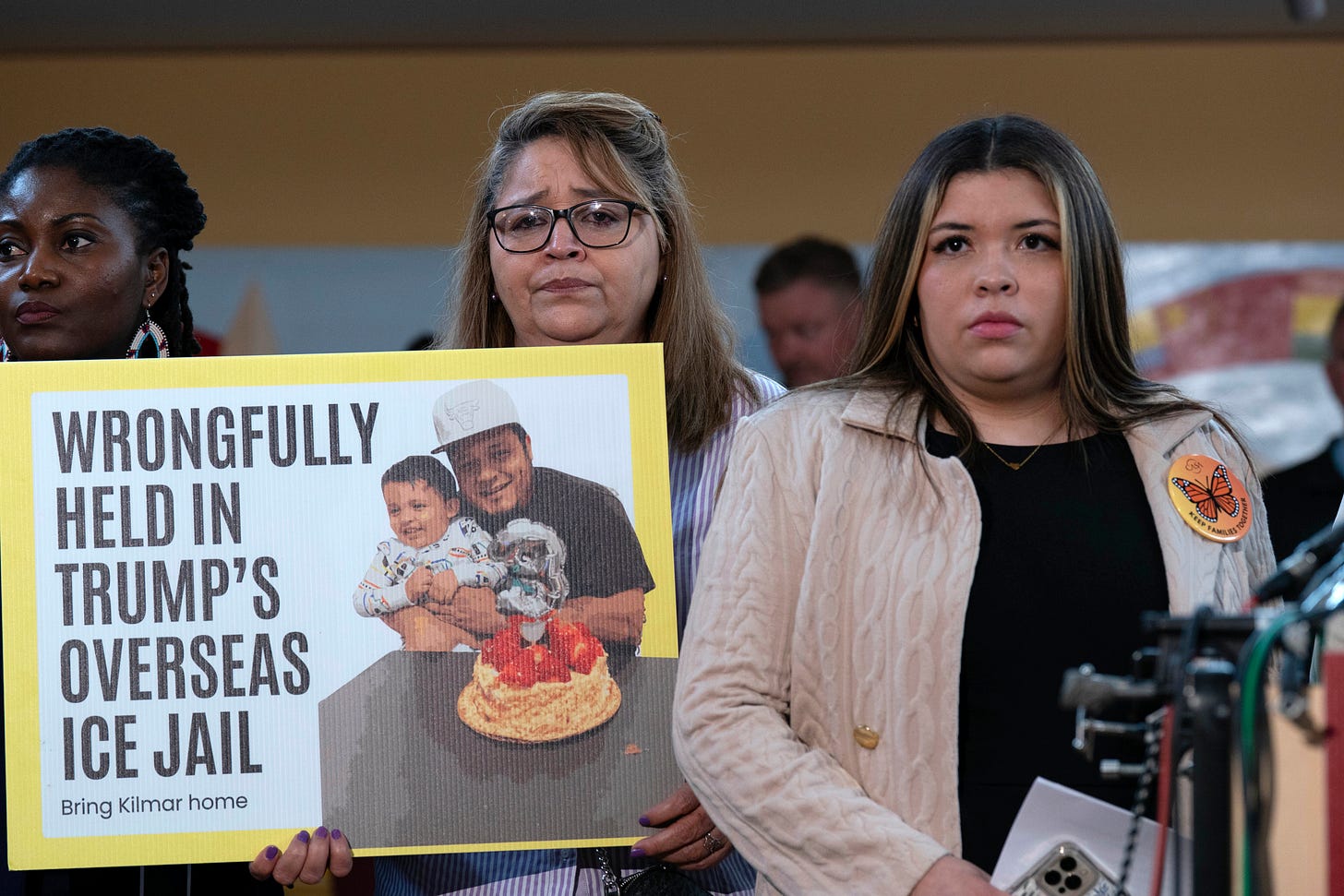Is Trump Looking for an Off-Ramp in Abrego Garcia?
ABC is reporting that the Justice Department has opened a criminal investigation into a 2022 traffic stop. Are they trying to avoid an embarrassing habeas defeat?
Early this morning, ABC news reported:
The U.S. Department of Justice has been quietly investigating a Tennessee traffic stop in 2022 involving Kilmar Abrego Garcia, the Salvadoran man at the center of a high-profile court battle over his mistaken deportation from Maryland to El Salvador by the Trump administration, ABC News has learned.
Federal investigators involved in the inquiry recently spoke with a convicted felon in an Alabama prison and questioned him about potential connections to Abrego Garcia, according to sources familiar with the investigation.
My initial reaction to this story is that the administration is continuing its smear campaign against Abrego Garcia to justify their unlawful removal of him under the Alien Enemies Act. They’ve been working hard to paint this man as the “worst of the worst,” and this seemed - at first blush - to be part of that effort.
But then I remembered something I read from Steve Vladeck’s One First newsletter about constructive custody:
Consider the case of Ahmed Omar Abu Ali, a U.S. citizen who was being held in Saudi Arabia in 2004. Abu Ali’s parents brought a habeas petition in the D.C. federal district court (naming Attorney General Ashcroft as the respondent), alleging that, although their son was in a Saudi prison, he was being held (and interrogated) only at the behest of the U.S. government as a way of avoiding judicial review in the United States. Judge Bates ruled that, if those allegations were valid, he would have jurisdiction over the habeas petition—not because he could order the Saudi government to release one of its own prisoners, but because he could order the U.S. government to cease doing … whatever it was doing. Bates thus ordered jurisdictional discovery into the extent of the U.S. government’s involvement—at which point, the U.S. government … mooted the case (by indicting Abu Ali on criminal charges and promptly transferring him to U.S. custody in Virginia—indirectly vindicating the central allegation in his habeas petition).
As you know by now, the government is in the middle of a potentially embarrassing discovery process in the case of Abrego Garcia in which Judge Xinis has ordered multiple depositions from government officials and the production of documents - possibly requiring the government to disclose its agreement with President Bukele. That agreement could include a deal to hand over a member of MS-13 to El Salvador in order to prevent him from testifying against Bukele, and the existence of the agreement could prove that the United States has constructive custody over the people being unlawfully held at CECOT. In fact, the El Salvador Ministry of Foreign Affairs has published a memorandum reflecting the agreement saying El Salvador has agreed to hold detainees for one year, pending the United States' decision on their "long term disposition."
The Trump administration has argued that they do not have constructive custody over anyone at CECOT, and that no one should take public statements at face value because the government has declared they do not have constructive custody. In other words: don’t rely on the lies we tell to the public.
So I’m wondering if this sudden criminal investigation into Abrego Garcia isn’t an attempt by the Trump regime to avoid a politically embarrassing discovery process in court because bringing him home to face charges would effectively moot this particular case and provide some bit of cover for the government as it did in the Abu Ali case back in 2004.
However, this regime doesn’t seem to care much about optics, nor would this alleviate the government from facing the question of whether its invocation of the Alien Enemies Act is legal. There are now two cases - one in the Southern District of Texas and one in the Southern District of New York - where federal judges have found Trump’s use of the Alien Enemies Act to be unlawful. Both cases will no doubt face appeals that would eventually end up before the Supreme Court.
Additionally, this does not moot the amended complaint brought by the ACLU in the District of Columbia before Judge Boasberg regarding the disposition of the rest of the men being held illegally in El Salvador.
As Andy McCabe and I discuss on the most recent episode of the UnJustified Podcast, the government may argue that they have taken steps to facilitate Abrego Garcia’s return by having Kristi Noem or another DHS official testify that they asked Bukele, and he said “no.” That might actually satisfy the vague Supreme Court order directing the government to “facilitate” the release of people in CECOT. But all of that might hinge on whether the court gets to see a copy of the agreement between the US and El Salvador - which could remain a secret a bit longer should the government decide to return Abrego Garcia to the US to face criminal charges.
We’ll keep following these cases on the UnJustified podcast and keep you informed.
~AG
(AP Photo/Jose Luis Magana)




We're expected to follow the laws of our nation and community, so it is quite reasonable to expect our government to do the same, and to have the reins pulled hard when it does not.
While one person is the focus, do not forget the hundreds more who were on the same illegal flight and are incarcerated in the same prison.
Thanks for keeping this unconstitutional denial of due process and illegal rendition of individuals to prisons that are in effect concentration camps. This regime is exiling American citizens in its cruel discriminatory actions. Trump, Vance, Miller, Musk, Rubio and more are well on their way to committing "war crimes" against humanity.